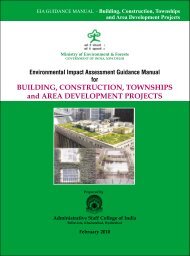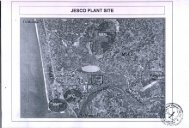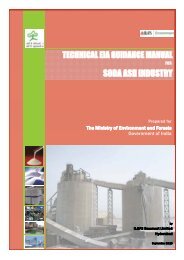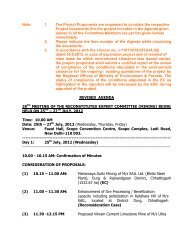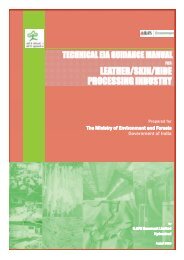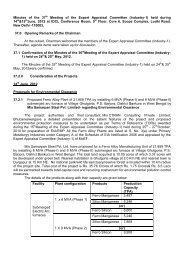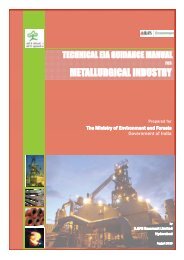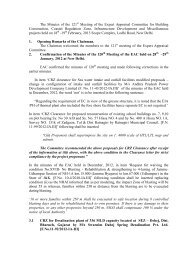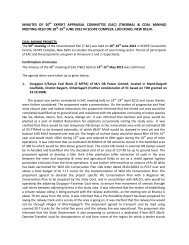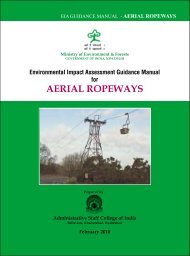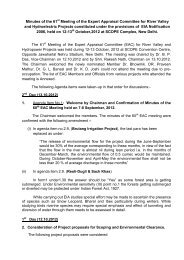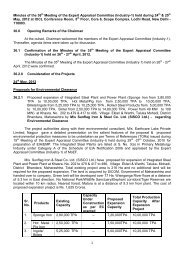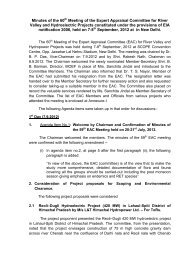- Page 1:
MINUTES OF2 ND RECONSTITUTED EXPERT
- Page 4 and 5:
5. Regular monitoring of influent a
- Page 6 and 7:
The revised draft EIA/EMP report sh
- Page 8 and 9:
vi.vii.viii.ix.Risk and Disaster Ma
- Page 10 and 11:
4. Secondary fugitive emissions fro
- Page 12 and 13:
µg/m 3 , 6 µg/m 3 to 21.3 µg/m 3
- Page 14 and 15:
permission for drawl of 16 MGD of w
- Page 16 and 17:
Ministry’s Regional Office at Ban
- Page 18 and 19:
iv.Secondary fugitive emissions sha
- Page 20 and 21:
EIA/EMP. Leather/skin/hide processi
- Page 22 and 23:
By-products1 HCl 0 16.95 16.952 Amm
- Page 24 and 25:
y M/s K. P. R. Industries (India) L
- Page 26 and 27:
chlorine storage area shall be prov
- Page 28 and 29:
ii.Bag filter alongwith stack of ad
- Page 30 and 31:
Points Latitude LongitudeA 23 o 12
- Page 32 and 33:
authorization or membership of TSDF
- Page 34 and 35:
proposed expansion is Rs.1, 663 Cro
- Page 36 and 37:
These analysis should include trace
- Page 38 and 39:
49. A note on the impact of drawl o
- Page 40 and 41:
a language other than English, an E
- Page 42 and 43:
eserved forests, wildlife sanctuari
- Page 44 and 45:
37. Impact of the transport of the
- Page 46 and 47:
66. Impact of the project on local
- Page 48 and 49:
project will be 56.51 MW, which wil
- Page 50 and 51:
31. Sources of secondary emissions,
- Page 52 and 53:
59. All stock piles will have to be
- Page 54 and 55:
Grain size analysis of quartziteRev
- Page 56 and 57:
1. Measures shall be taken to mitig
- Page 58 and 59:
On 17.6.2010, application was submi
- Page 60 and 61:
6. Regular monitoring of influent a
- Page 62 and 63:
2. Bag filter alongwith stack of ad
- Page 64 and 65:
vii) All the solvent storage tanks
- Page 66 and 67:
v) Total fresh water requirement fr
- Page 68 and 69:
5. Cathodic protection shall be pro
- Page 70 and 71:
SEIAA, Karnataka on 5.7.2011 after
- Page 72 and 73:
35. Ground water monitoring minimum
- Page 75 and 76:
2.4.8. Proposed Integrated Cement P
- Page 77 and 78:
vii) As proposed, Industrial efflue
- Page 79 and 80:
After detailed deliberations, the C
- Page 81 and 82:
Solvent red 135Solvent red168Solven
- Page 83 and 84:
556, 560, 561/1, Village Dudhwada,
- Page 85 and 86:
22 nd March, 2012 for Anand distric
- Page 87 and 88:
xviii. In case the commercial viabi
- Page 89 and 90:
SPM (0.0308ug/m 3 ), HC (8.87ug/m 3
- Page 91 and 92:
eneficial purposes. Domestic efflue
- Page 93 and 94:
Distillery Units are listed at S.N.
- Page 95 and 96:
during rainy season by flowing alon
- Page 97 and 98:
i. Distillery unit should be based
- Page 99 and 100:
Chemicals Industry (Bulk Drugs & In
- Page 101 and 102:
vi)Trade effluent should be segrega
- Page 103 and 104:
PM 10 (29 - 141 ug/m 3 ), NO x (10
- Page 105 and 106:
xi.xii.xiii.xiv.i. In case the comm
- Page 107 and 108:
2.5.14. Setting up of Di-methyl Sul
- Page 109 and 110:
concerned Authority and a copy subm
- Page 111 and 112:
viii. All the issues raised during
- Page 113 and 114:
2.5.17. Manufacture of Phenol Forma
- Page 115 and 116:
ix)Green belt should be developed i
- Page 117 and 118:
v. The company should make the arra
- Page 119 and 120:
xxvi.xxvii.Company should have own
- Page 121 and 122:
xi.xii.xiii.xiv.vii.viii.ix.Treated
- Page 123 and 124:
Water based drilling fluid will be
- Page 125 and 126:
vii.viii.ix.The company should cons
- Page 127 and 128:
awarded during the 18 th Meeting of
- Page 129 and 130:
iii.iv.Water based drilling mud sho
- Page 131 and 132:
‘Operator’ on 30.06.2010. Block
- Page 133 and 134:
3 95 O 06’22.74” 10 O 01’46.6
- Page 135 and 136:
25. Details of all environment and
- Page 137 and 138:
In the NPK mixtures plant, Unit wil
- Page 139 and 140:
41. Action plan for rainwater harve
- Page 141 and 142:
composted with press mud. Fly ash o
- Page 143 and 144:
42. What is the hierarchical system
- Page 145 and 146:
12. Present land use based on satel
- Page 147 and 148: IA.II (I) dated 4 th August, 2009,
- Page 149 and 150: 14. List of products alongwith the
- Page 151 and 152: iii. Authenticated English translat
- Page 153 and 154: 27. Action plan to control ambient
- Page 155 and 156: 2.5.30. Expansion of Synthetic Orga
- Page 157 and 158: 16. List of products alongwith the
- Page 159 and 160: i. All documents shall be properly
- Page 161 and 162: 24. Lagoon capacity for sugar unit
- Page 163 and 164: S.N. Product Capacity (MTPD)1 Urea
- Page 165 and 166: 44. Socio-economic development acti
- Page 167 and 168: 6. A map indicating location of the
- Page 169 and 170: (a) Does the company have a well la
- Page 171 and 172: 13. Present land use based on satel
- Page 173 and 174: 52. Any litigation pending against
- Page 175 and 176: 12. Project site location alongwith
- Page 177 and 178: 51. Public hearing to be conducted
- Page 179 and 180: 20. Air pollution control measures
- Page 181 and 182: The Committee decided that the prop
- Page 183 and 184: 31. Treatment of phenol in the effl
- Page 185 and 186: located outside the notified indust
- Page 187 and 188: 38. Action plan for rainwater harve
- Page 189 and 190: 11011/381/2006-IA II (I) dated 11 t
- Page 191 and 192: e ground water. Oily effluent will
- Page 193 and 194: xv.xvi..xvii.xviii.xix.xx.xxi.xxii.
- Page 195 and 196: with a capacity of 4.5 KL/day. No N
- Page 197: to 90 % and will be sold as cattle
- Page 201 and 202: vii) As proposed, Industrial efflue
- Page 203 and 204: i) Ambient air quality data should
- Page 205 and 206: Discarded drums and empty bags will
- Page 207 and 208: project is PM (1.775 ug/m 3 ), SO 2
- Page 209 and 210: 0.7Crores. No wildlife sanctuary/ r
- Page 211 and 212: The project authorities and their c
- Page 213 and 214: 38. Action plan for rainwater harve
- Page 215 and 216: 26 Methyl Ethyl ketone 200027 4-Nit
- Page 217 and 218: 4. Regulatory framework5. A map ind
- Page 219 and 220: the environmental or forest norms /
- Page 221 and 222: 12. Location of National Park/Wild
- Page 223 and 224: 45. What is the hierarchical system
- Page 225 and 226: After detailed deliberations, the E
- Page 227 and 228: 46. Corporate Environmental Respons
- Page 229 and 230: 12. Project site location alongwith
- Page 231 and 232: i. All documents shall be properly
- Page 233 and 234: 17. Ambient air quality monitoring
- Page 235 and 236: vi.vii.The final EIA-EMP report sub
- Page 237 and 238: 11. Manufacturing process details o
- Page 239 and 240: iv. The letter/application for EC s
- Page 241 and 242: 21. The suspended particulate matte
- Page 243 and 244: 51. Details of Corporate Social Res
- Page 245 and 246: 31. M/s Bhushan Steel Limited p32.



